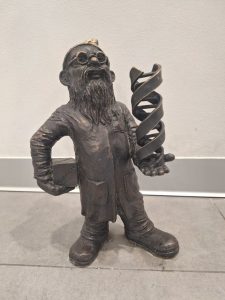Przejdź do treści
 Workshops will be organized for groups of 10 people!
Workshops will be organized for groups of 10 people!
BIOIMAGING – COMPLETE!
This workshop will delve into advanced bioimaging techniques used to study cancerous and normal cells. Participants will gain hands-on experience with two cutting-edge imaging modalities: confocal microscopy and holotomographic imaging. These technologies are essential tools in modern biomedical research, offering unparalleled insights into cellular processes and structures. Learn the principles of fluorescence-based imaging for high-resolution visualization of cellular components. Understand how holotomography enables 3D visualization of cellular structures, such as organelles, cytoplasmic density, and deformability, without phototoxicity or interference with cellular physiology. This workshop is ideal for researchers, clinicians, and students interested in bioimaging applications in oncology and cellular biology.
Flow cytometry is a tool for multi-parameter analysis with Cyto-Logic – COMPLETE!
The workshops are dedicated to young scientists, diagnosticians, pharmacists, and doctors interested in flow cytometry (education points will be awarded). During this workshop, you will get the knowledge about (1) „Mapping the Invisible with Cyto-Logic – Nano-Flow Cytometry for EV-Based Diagnostics” – flow cytometry has secured a solid position among laboratory techniques supporting clinical diagnostics, particularly in the detection and monitoring of hematological malignancies. With the rapid advancements in nano-flow cytometry, a new frontier is emerging — the precise detection and characterization of extracellular vesicles (EVs). Could these technological breakthroughs position nano-flow cytometry as a complementary, or even leading, tool for the early detection of cellular pathologies? Join us to explore the principles, applications, and future potential of EV detection through nano-flow cytometry in clinical and translational diagnostics. (2) „Unmasking Artifacts: Imaging in Immunophenotyping powered by Cyto-Logic” – a well-designed immunophenotyping panel and carefully selected fluorochromes form the foundation of reliable cytometric analysis. In this workshop, we will highlight common artifacts encountered when working with conventional flow cytometers and demonstrate how to detect and minimize their impact by integrating high-throughput bright-field imaging with high-resolution and high-speed immunophenotyping.
Clinical Flow Cytometry with Sysmex – COMPLETE!
During the workshop, Sysmex application specialists will present practical applications of Clinical Flow Cytometry in the diagnosis of selected disease entities. Participants will have the opportunity to explore real clinical data and learn about Sysmex’s full portfolio of innovative solutions in the field of flow cytometry, supporting modern laboratory diagnostics.
Conventional vs Spectral Cytometry – 2:1 for CytoFLEX LX Mosaic– STILL AVAILABLE!
This event is designed for those interested in deepening their understanding of the differences between conventional and spectral cytometry, with a special focus on the capabilities of the CytoFLEX LX Mosaic system. The workshop combines theoretical insights with a live experimental demonstration and interactive discussion. It is a great opportunity to learn how to efficiently design flow panels and analyze data using spectral technology and unmixing algorithms.
Electroporation in vitro – STILL AVAILABLE!
Pulsed electric field (PEF) i.e. electroporation is commonly used to facilitate the delivery of various molecules, including pharmaceuticals, into living cells. This workshop will introduce you to the basics of the electroporation technique in vitro and how to determine if cells are permeabilized.
Mastering 3D Cancer Spheroids: From Creation to Analysis – COMPLETE!
Step into the future of cancer research with this interactive workshop on 3D cell cultures. Learn how to generate cancer spheroids using various techniques and explore powerful methods to study them. From tracking growth and assessing viability to performing fluorescence staining and image-based analysis — you’ll get hands-on experience with tools that bring tumors to life in the lab.
 Workshops will be organized for groups of 10 people!
Workshops will be organized for groups of 10 people!